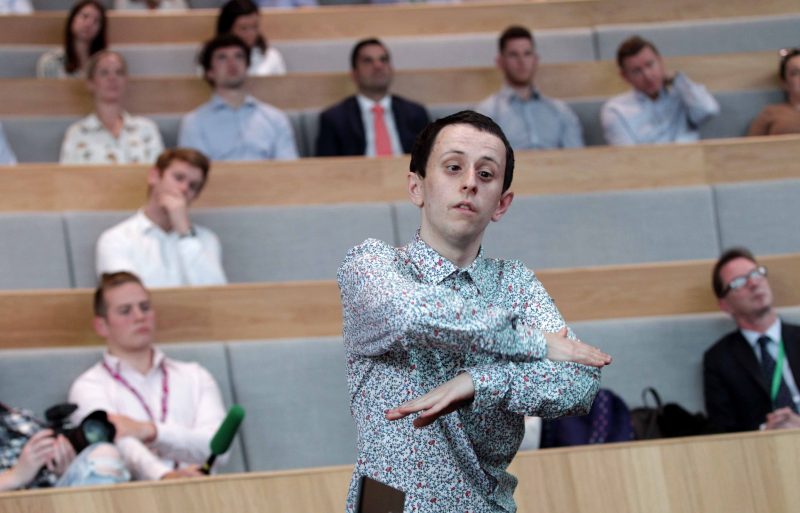Europe’s First Orchestra For Young People With Disabilities Is Making Its Debut
by Mícheál Ó Scannail
Central photo: Shaun Healy pictured conducting during a performance at the launch of OYOI. PHOTO: Mark Stedman
Ireland’s only disabled-led orchestra is preparing for its inaugural performance, which will showcase adaptive instruments, virtual reality music and revolutionary ‘conductology’.
The first orchestra of its kind in Europe, the Open Youth Orchestra of Ireland (OYOI) will hold its inaugural performance on Sunday at Athlone Institute of Technology.
The group will not only showcase their musical ability, but also their adaptive instruments, including a virtual reality element, and their new innovative means of understanding the music called ‘Conductology.’
The musicians work to the 18-gesture system, devised by pioneering music educator Dr Denise White of Ulster University and a member of the group Shaun Healy.
The gesture-based language acts almost like sheet music for typical orchestras, so that anywhere in the world, if musicians are performing and rehearsing individually apart from each other, the conductology acts as a playing prompt. The gestures allow the conductologist to direct musicians.
Since the OYOI is made up of four provincial ‘Le Chéile’ ensembles, the new system allows them to collaborate within a guiding framework, and driven by each ensemble director, despite not practising together.
One of the creators of the technique, Mr Healy, a conductor from the Le Chéile group in Ulster, said that the music helps him to forget about his disability.
“Myself and Dr White created this thing called Conductology,” the 24-year-old said.
“It’s about having a freedom and expressing people’s emotions and talents. We made different gestures up for different ways of conducting and that allows the musicians to have the freedom to make up their own rhythm and to create their own music.
“I have a thing called special needs – which means I have a little tremor – but whenever I conduct music it makes it stop. It gives me an energy feeling. It gives me that freedom that people might not have had for a long time. It’s all about having no barriers. Anybody can do music, no matter what disability they might have. Music can be adapted to suit them.
“Whenever I’m conducting I just close my eyes and picture a colorful rainbow. It shows people out there who don’t believe in people with special needs, that they can do things. They just need to get the bigger picture and see that we can do things whether we have special needs or not.”
The group was formulated by the Royal Irish Academy of Music (RIAM) after they decided to explore which subset of Ireland did not get to express their creativity through music.
As well as the pioneering conducting style, the group also enjoys access to conventional instruments as well as adaptive and virtual reality tools.
Brendan Breslin, Head of RIAM Connect, said that the project aims to open music up to anyone who wants to take part.
“The adaptive music technology is actually simply mac books and iPads and readily accessible technology that we can buy on the Internet or get in shops,” he said.
“It’s the software that engages the musicians, where we can take sounds that they have extracted from their own environment and put that into the computer so they can perform using the sound itself.
“The virtual reality (VR) is the next step and it means that everybody can access the same amount of performance as others, specifically for people with physical challenges.
“We have a member with quadriplegic cerebral palsy and it means that he can engage on a music platform – where he is going through VR and performing music the same as the others.”
John Lynch, a member of the group, said that all of the musicians love playing music together, but also appreciate the chance to make new friends and have fun.
” I use the push pads – the buttons,” he said.
“It creates sounds. I am excited for Sunday. This will be a great opportunity to meet some other students from right across Ireland, the likes of Cork, Athlone and Dublin. We have fun and we love to make new friends. We have found that it’s fantastic.”
